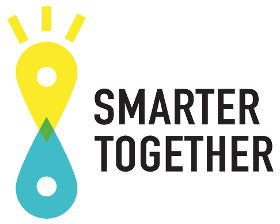
SMARTER TOGETHER

The sustainable development of cities is a high priority for the European Union. The aim is to be equipped to face the challenges of the future. In the face of climate change, demographic change and shifting population structures, the foundations need to be laid today to ensure a liveable environment for citizens now and in the future. Smart integrated solutions are intended to improve quality of life in cities.
This is precisely why "Smart City" is such an important topic for the City of Munich. A "Smart City" is made up of various different components – it combines urban planning with technology, research, social and economic affairs. Thematic guidelines on "Digital Transformation and Smart City" are currently being created in Munich as part of the urban development concept. The EU project SMARTER TOGETHER (Smart and Inclusive Solutions for a Better Life in Urban Districts) is the first major building block of this concept for the City of Munich, where the project is being managed by the Department of Labour and Economic Development. Over 40 city consortia applied for a Horizon 2020 grant from the European Commission – the SMARTER TOGETHER consortium came second in the final process and received funding as one of four successful projects. The EU Commission praised the joint project proposed by the cities of Munich, Lyon (France) and Vienna (Austria) for finding the right balance between innovative technologies and social aspects.
The "lighthouse cities" of Lyon, Vienna and Munich are taking the lead in the SMARTER TOGETHER project. All three cities have one thing in common: They are growing rapidly and provide a proper framework for the development of renewable energy. The Neuaubing-Westkreuz district, which needs refurbishment, and the neighbouring new housing development area of Freiham are the model city districts in Munich. Neuaubing-Westkreuz covers 350 hectares. 30,000 people with a wide variety of socio-economic backgrounds live there and many of the existing buildings date from the 1960s, 1970s and 1980s. A new city district of 350 hectares is being created in Freiham; up to 20,000 people will live and 7,500 people will work there. With the help of innovative business models, SMARTER TOGETHER is planning to create the city district of the future in cooperation with its citizens, in order to achieve maximum energy efficiency and interconnected mobility. The project started on 1 February 2016 and will end in January 2021.
Project Overview
Project aims and fields of work
The measures on the agenda of the international consortium for the next five years are based on a sharing economy, the joint use of goods and services, the recycling of resources, innovative business models, user-friendly services and target-orientated and socially responsible use of modern technology. The active participation of citizens is a further central aspect of the project.
The planned measures can be divided into five main categories:
- The "Stadtteillabor" (Living Lab) set up to encourage the participation of citizens and user groups. The concept goes far beyond previous forms of citizen participation; users work with companies and local providers to develop solutions for urban mobility and energy-saving.
- The development of low-energy districts, based on renewable district heating (geothermal and low-temperature district heating) and renewable energy supplies
- Holistic refurbishment of existing housing (energy-related high-standard refurbishment of 42,000 square metres of living space, on-site consultation) and safeguarding of current rent levels
- The expansion of integrated infrastructures in the form of smart data management platforms and services (e.g. intelligent lamp posts, distribution points for goods, services and district-specific sharing economy approaches, apps, etc.)
- Sustainable district mobility solutions, such as car-sharing systems, e-bikes and cargo-bikes for delivery services, mobility points with information pillars, etc.
Target group
The SMARTER TOGETHER project results will benefit
- Citizens – by improving their quality of life and encouraging their active participation in shaping the project and their living environment.
- Participating municipalities, which will profit from the lighthouse city projects and be able to apply the same approaches for their own citizens.
- Companies and start-ups with innovative business models, which will be given the opportunity to open up new markets.
BayFOR as a partner
The Bavarian Research Alliance has supported SMARTER TOGETHER throughout the entire application and contract preparation phase. It was commissioned by the City of Munich to provide ongoing advice on project implementation and project management. Specifically, BayFOR is the contact point for the Munich Project Office (the office in charge of administrative project management for the City of Munich).
Funding period
A total of EUR 24.7 million in European funding is set to flow into the consortium between February 2016 and January 2021. Munich will receive around EUR 6.9 million of these funds. These will be supplemented by the city's own funds and extra funding from industry and research.
Consortium
The three lighthouse cities – Munich, Lyon and Vienna – have attracted leading European industry and research partners, as well as highly specialised small and medium-sized enterprises from all over Europe to join their project, SMARTER TOGETHER is coordinated by Lyon Confluence (France).
30 participating partners:
AIT Austrian Institute of Technology
Algoé
Austrian Post
Bettervest
BWS Gemeinnutzige allgemeine Bau-, Wohn- und Siedlungsgenossenschaft, registrierte Genossenschaft mit beschränkter Haftung
City of Santiago de Compostela
City of Sophia
City of Venice
City of Vienna
DIN Deutsches Institut für Normung
ERDF – Électricité Réseau Distribution France S.A.
Energy Cities, the European association of local authorities in energy transition
Enertech
Fraunhofer
G5-Partners Wolfram Scholl
GOPA Com. S.A.
HESPUL Association
KELAG Wärme
Lyon Confluence
Lyon Metropolis
Securitas
Siemens Germany
Siemens Austria
Spectrum Mobil
SYCUBE Informationstechnologie
Technical University of Munich
Toshiba
University of St.Gallen
Wiener Stadtwerke
Further information
Contact

Bernhard Klassen
City of Munich
Department of Labour and Economic Development
SMARTER TOGETHER Project partner
Phone: +49 (0)89 23330196
E-mail: smarter-together@no-spam-pleasemuenchen.de




